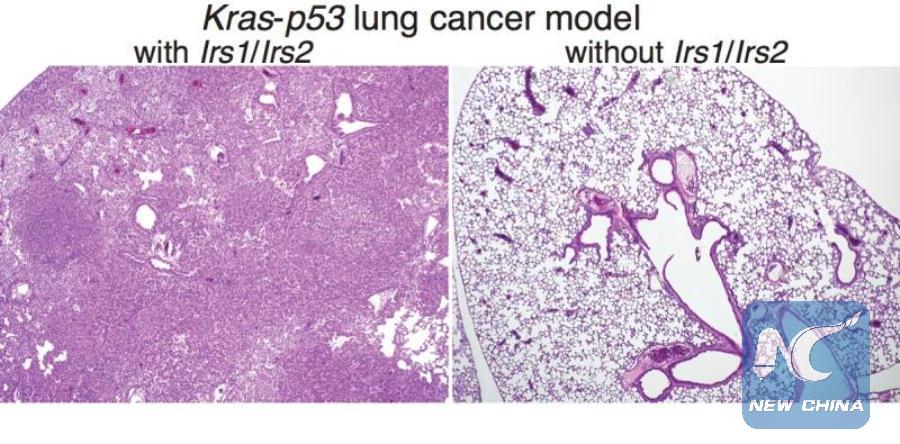
Basal-like breast cancer cells form multiple metastatic tumors (arrowheads) in the lungs of control mice (left), but metastasis is suppressed by zoledronic acid treatment (right). (Credit: Cao et al)
WASHINGTON, May 4 (Xinhua) -- Chinese researchers discovered that a widely-used osteoporosis drug might prevent the spread of a particular aggressive form of breast cancer that typically affects younger, premenopausal women.
A study published on Friday in the Journal of Experimental Medicine revealed that the zoledronic acid could inhibit UGT8 or UDP Glycosyltransferase 8, an enzyme that drives the progression of basal-like breast cancer.
The Basal-like breast cancer is largely untreatable because the tumor cells are usually lacking the estrogen receptor, progesterone receptor, and HER2 protein that are the main therapeutic targets for other forms of breast cancer.
The researchers from Zhejiang University School of Medicine examined over 5,000 breast cancer patient samples and found that levels of the metabolic enzyme UGT8 were dramatically elevated in patients with basal-like breast cancer.
Higher UGT8 levels correlated with increased tumor size, higher tumor grade, and shorter patient survival times, according to the study.
UGT8 catalyzes the first step in the synthesis of sulfatide, a type of lipid that is found on the surface of cells and has been implicated in cancer progression.
Dong Chenfang, an oncologist professor with Zhejiang University, and his colleagues found that breast cancer cells expressing high levels of UGT8 produced large amounts of sulfatide, which in turn activated signaling pathways crucial for the survival and metastasis of basal-like breast cancer.
The researchers also found that depleting UGT8 from these cells lowered sulfatide levels and reduced the cells' ability to form tumors when injected into mice.
They confirmed that zoledronic acid is a direct inhibitor of UGT8 that reduces the levels of sulfatide in basal-like breast cancer cells. Zoledronic acid is a drug that is approved to treat a variety of bone diseases, including osteoporosis.
Treatment with the drug impaired the cells' ability to invade their surroundings and, accordingly, prevented them from metastasizing to the lungs after they were injected into the mice.
"Pharmacological inhibition of UGT8 by zoledronic acid offers a promising opportunity for the clinical treatment of this challenging disease," Dong said.

